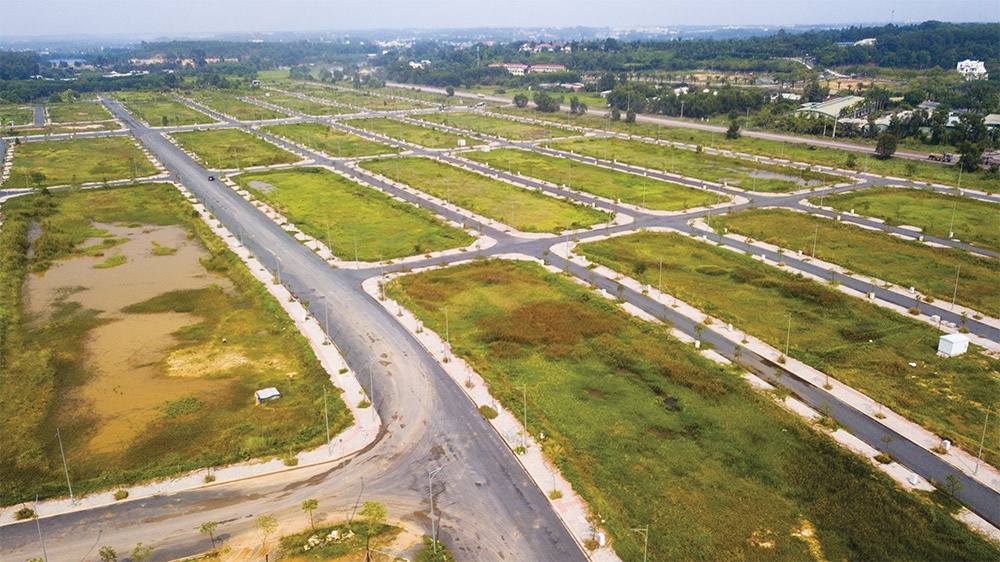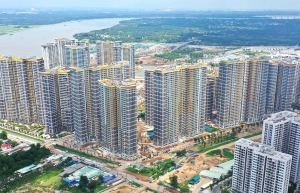Real estate businesses expand interest in available land to thrive in 2025
The Ministry of Construction’s October report highlighted that legality, liquidity, and land use fees are the primary considerations for businesses selecting land investments. Recent market trends show that real estate firms are increasingly focused on developing land in preparation for the sector’s recovery.
 |
| There is a renewed push to increase the size of land portfolios, photo Le Toan |
Accordingly, companies are carefully formulating their plans to secure legally compliant, fully paid land projects that can be operational as soon as land rights are granted, the report said.
With limited supply, access to land resources has become not only a strategic objective for major corporations but also a critical lifeline for many real estate firms. To secure new land resources, businesses are employing a variety of approaches.
In the Mekong Delta province of Long An, Truong Son Real Estate Company and Him Lam Company formed a joint venture in September to develop a residential project in Duc Hoa district spanning over 215 hectares, with funding of $467 million. If approved, the project, which seeks to begin in 2026, will offer nearly 3,000 units, including town houses, villas, and social housing.
Meanwhile, Malaysian real estate giant SkyWorld has been actively pursuing new land opportunities in Vietnam. In the same month, SkyWorld Development Vietnam, acquired all 1.7 million shares of Thuan Thanh Real Estate Trade for $14.5 million. Thuan Thanh is the legal owner of a 2,000 sq.m plot in District 8 of Ho Chi Minh City.
Luong Tri Thin, chairman of Dat Xanh Group, also revealed plans to acquire 100-200ha of land nationwide with complete legal documentation for project development. “We aim to acquire and merge project land portfolios with the potential to meet real market needs. Our immediate focus is on legal, clean land in Binh Phuoc and Dong Nai provinces,” Thin said.
However, securing legally compliant land remains challenging. Rising land prices, intense competition, and legal risks are hurdles that businesses must navigate. With thorough preparation and flexible strategies, companies can overcome these difficulties and tap into promising investment opportunities.
Experts view this end-of-year push to expand land portfolios as a positive signal, reflecting an eagerness to gain a head start ahead of an anticipated market recovery next year.
According to Linh Tran, deputy director of Investment at Savills Vietnam, foreign interest in Vietnamese real estate has surged, bolstered by recent legal reforms. “The amended laws on land and real estate business have streamlined procedures, expanded real estate supply, and opened new avenues for foreign investors,” Tran said.
She added that the government’s efforts to refine the legal framework and stabilise the investment environment are expected to attract more foreign interest in the years ahead.
“For foreign investors entering Vietnam, projects with a clean legal status and ready for immediate execution are preferred. Therefore, businesses must restructure any projects failing to meet deadlines or profitability targets to align with their investment goals,” Tran explained.
Some companies are focusing on acquiring projects with financial challenges, while others seek partnerships with substantial landowners. Joint ventures, along with submissions of registration documents and project proposals in collaboration with local authorities, are also widely applied strategies, she added.
 | Ho Chi Minh City revamps land status Real estate investors in Ho Chi Minh City are now no longer able to subdivide land plots for sale in projects for individuals to build their own houses. |
What the stars mean:
★ Poor ★ ★ Promising ★★★ Good ★★★★ Very good ★★★★★ Exceptional
Related Contents
Latest News
More News
- Ho Chi Minh City's industrial parks top $5.3 billion investment in 2025 (January 06, 2026 | 08:38)
- Why Vietnam must build a global strategy for its construction industry (December 31, 2025 | 18:57)
- Housing operations must be effective (December 29, 2025 | 10:00)
- Developers that optimise costs will win out in green transition (December 29, 2025 | 09:37)
- Vietnam charts path to mature smart cities with AI at the core (December 26, 2025 | 16:10)
- Three-way partnership unveiled to ease financing at Hong Hac City (December 24, 2025 | 14:13)
- JustCo expands business into Vietnam (December 22, 2025 | 17:58)
- Sun Group breaks ground on $2 billion Van Don casino complex (December 19, 2025 | 18:14)
- Rare, beautiful, sustainable: the mark of iconic real estate (December 19, 2025 | 08:00)
- Owner-occupied housing stabilises, paving the way for new growth cycle (December 18, 2025 | 17:04)

 Tag:
Tag:




















 Mobile Version
Mobile Version